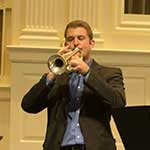Great teaching gives musicians the ability to teach themselves.
About
training trumpeters to teach themselves
About Ben Wright
Training to develop independent thinking, physical efficiency, problem-solving, and a greater sense of confidence playing the trumpet
Over the course of two decades of performing in The Boston Symphony (and the Chicago Symphony before that), and teaching at the New England Conservatory, I have learned to teach development of independent thinking, physical efficiency, problem-solving, and a greater sense of confidence playing the trumpet.
In my first lesson with Mark Gould, he told me goal for me was learning to sound like myself and to teach myself. Get out of school and start the real learning process. Over the years, I have solved issues related to physical injury, career setbacks, performance anxiety, flexibility, strength, and more. I want to share this approach with highly motivated players so they can reach their goals faster. I call it T5 – Training Trumpers To Teach Themselves.

Sometimes I will see players for single lessons – often it is in preparation for an audition. We are asked basically to exercise our ears and critical thinking and provide feedback. This is a pretty easy task for the most part – identify what isn’t in the presentation and give some short pointers on how things might improve. This works well for the players who just need that final 1-3 percent to win an audition and I am happy to do this kind of work. However, it doesn’t encourage a back and forth with the student which is where the most ground may ultimately be gained in terms of longer-term development.
When I hear some part of the player’s overall technique that needs improving in one of those coaching sessions, I want to give more information: for instance, the middle run of Petrouchka is challenging to many players because they haven’t learned how to be more flexible. Players will often address this by thinking they only need better lip slurs. In reality, they could be tensing all kinds of muscles they don’t need to play the passage. As time goes by they can start to believe they “just aren’t flexible”. This can lead to anger and frustration.
A player in a T5 program would be addressing these issues in myriad ways:
- Stop using the past as your reference point – form new habits to become more flexible.
- Find the most effective syllable can greatly enhance flexibility (Tu, tee, tah, toh, etc)
- Sing the passage with that syllable with proper breathing and posture. Use that approach when you move to playing it.
- Use the muscles you need – not the ones you don’t
- Compare notes with your T5 Practice Partner
- Check in with me on practice habits in Practice Window training
- All the above builds skill and confidence for when you perform the excerpt for T5 Studio Class and out in the world.
T5 Pillars
STAY BALANCED
FIND YOUR MEDIAN AND STAY ON IT
Achieving success in a competitive field like classical music is no different than in professional sports. Talent is helpful, diligent hard work is needed, and the ability to maintain mental and physical balance is crucial in tying it all together.
Beyond the Chops
Integrated Mechanics for the Trumpet
Trumpet playing requires the use of your whole body. Strong facial muscles are certainly important, but not enough. Hundreds of muscles are recruited to play one note (Caruso said 210). Chops are only part of the picture.
The Sound Truth Library features unedited recordings from my practice room with no added reverberation. Though trumpet players often imitate what they hear on recordings or in live concerts, their teachers’ sound in a smaller room is where the Sound Truth lies. This clear, focused, and compact sound is how we project from the stage.
PRACTICE WINDOW TRAINING
LEARN TO PRACTICE EFFICIENTLY
Practice Windows are 5-minute videos recorded during a practice session. The idea is to capture a short clip of how you actually practice – it is not a performance. Practice Window Training™ is a 20-minute lesson, watching the Practice Window together, to create a more efficient, productive, and satisfying practice experience.
community counts
creative inspiration and support
Musicians need creative inspiration and support. Even though there are many hours spent alone in practice rooms, having a community is crucial.
T5 fosters connection through rotating practice partners, studio class, the T5 Facebook group, and Trumpet Chats. We should all strive to learn from one another. Creating a safe space to share and test new ideas is part of the T5 program.
“With Up Your Game, I am getting the same information via his high-quality audio setup as if I were sitting in the same room with him, without the expense and hassle of traveling to Boston.
The Sound Truth Library videos and Practice Window Training create a great feedback loop – I listen to Ben play an excerpt and the same week be coached on how to work through it at home.
The Practice Window training really helped me create better practice habits – it quickly showed me how I could be more efficient in getting to my goals faster.”
Ben Hauser
Current Up Your Game participant

“
Testimonials
“Ben’s teaching made me see the importance of playing longer lines and being more organized. Hearing him in person and in the orchestra was always inspiring. My playing wouldn’t be where it is today if I hadn’t studied with him.“
“Ben has been an incredible mentor and teacher for me, and I can’t thank him enough for all the invaluable lessons he has given me in music and beyond…. The perspective he provided was just the right push at just the right time to allow me to be happy and successful here and now.“
“Ben’s approach of singing to save chop time and focus on the music was really beneficial to me. His focus on being mentally and physically balanced was one of the keys to my success in winning auditions. Years after I studied with Ben, he was a pillar of support when I needed his it most – his advice helped me bounce back from a challenging time in my career and move forward.“


